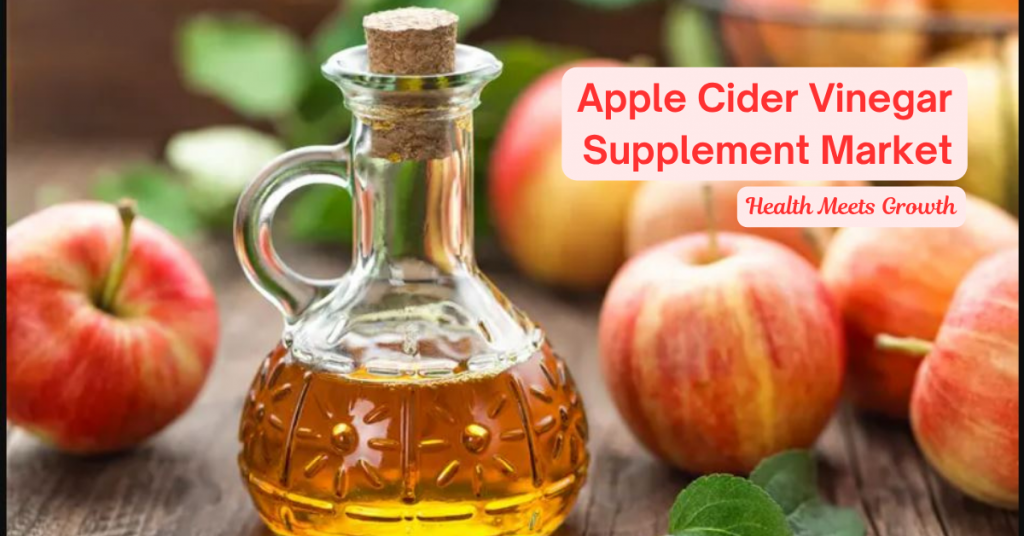
Market Overview
The Apple Cider Vinegar Supplement Market size was valued at USD 1,250 million in 2024 and is anticipated to reach USD 2,546 million by 2032, at a CAGR of 9.3% during the forecast period (2024–2032). This strong growth reflects the increasing global consumer preference for natural health supplements and functional foods that align with preventive wellness practices. The surge in demand is rooted in rising health awareness, a shift in dietary habits, and the preference for plant-based, organic, and non-pharmaceutical solutions for weight loss, detox, and digestion.
The global importance of apple cider vinegar (ACV) supplements is rising as consumers prioritize immune health and metabolic balance. These supplements, particularly in capsules and gummy formats, offer a convenient and palatable option compared to traditional liquid vinegar. The product’s appeal is further enhanced by growing endorsements from fitness influencers and wellness brands on social media platforms. Moreover, the expansion of e-commerce and digital retail channels has facilitated product visibility and accessibility worldwide.
ACV supplements are being integrated into preventive health routines across various age groups, not only in Western markets but also in emerging economies. With rising disposable incomes and growing interest in self-care products in regions such as Asia Pacific and Latin America, the market is likely to maintain a strong growth trajectory. Innovation in flavor profiles, packaging, and added functional ingredients (like probiotics or vitamins) is expected to further drive adoption and market diversification.
Read full report: https://www.credenceresearch.com/report/apple-cider-vinegar-supplement-market
Market Drivers
Rising Health Awareness Among Consumers
The modern consumer is highly focused on preventive healthcare. Apple cider vinegar supplements are increasingly viewed as natural remedies for weight control, detoxification, and improved digestion. Rising awareness regarding lifestyle diseases like obesity and diabetes has created fertile ground for such supplements to gain popularity. Many health-conscious consumers now prefer apple cider vinegar in supplemental form due to its ease of use.
Growing Popularity of Functional Foods and Nutraceuticals
The shift from synthetic to natural and plant-based wellness products has fueled the functional food and nutraceutical market. ACV supplements fall squarely into this category. Their inclusion in daily routines—whether for metabolism enhancement or blood sugar control—has helped carve a niche within broader wellness trends. The rising popularity of dietary supplementation, especially post-pandemic, is a major contributor.
Expansion of E-Commerce and Digital Marketing
The availability of ACV supplements on e-commerce platforms has opened vast opportunities for both global and niche brands. Online platforms facilitate not only easy access but also brand storytelling through influencer marketing, consumer testimonials, and targeted campaigns. These marketing techniques have contributed significantly to market growth and consumer trust in apple cider vinegar supplements.
Innovation in Formulation and Packaging
Brands are introducing ACV in various forms, including gummies, capsules, tablets, and powders, to cater to different consumer preferences. Gummies, in particular, are seeing rapid uptake due to taste and ease of consumption. Companies are also focusing on aesthetic and sustainable packaging to attract eco-conscious consumers, giving an edge in competitive retail environments.
Market Challenges
Strong Competition in the Supplement Industry
The apple cider vinegar supplement market faces stiff competition from other natural and synthetic health supplements. Players in the probiotic, herbal, and vitamin segments compete directly for consumer attention, making differentiation difficult.
Taste and Palatability Concerns
While formulations like gummies have improved taste profiles, traditional apple cider vinegar is known for its strong and often unpleasant taste. This sensory barrier, although less significant in capsules, still hinders complete market penetration in some demographics.
Regulatory and Labeling Standards
The global supplement market is highly regulated, with varying standards across regions. Ensuring compliance with labeling and health claims often adds complexity for manufacturers and may slow market entry in certain countries.
Consumer Skepticism and Misinformation
Many consumers remain skeptical about the efficacy of supplements, including ACV. The market is occasionally affected by unverified health claims, leading to distrust or backlash. This limits acceptance among new users, particularly in medically cautious markets.
Market Opportunity
Expansion into Emerging Markets
As middle-class populations grow across Asia Pacific, Latin America, and Africa, demand for health supplements is on the rise. These untapped markets present strong opportunities for global brands to enter and establish a loyal consumer base.
Personalized Nutrition and Lifestyle Targeting
Apple cider vinegar supplements can be integrated into personalized wellness plans. Companies offering tailored solutions based on age, lifestyle, or dietary needs could capture consumer interest more effectively and drive up adoption rates.
Cross-Product Innovation
The integration of ACV with other ingredients—such as green tea, probiotics, or collagen—offers a compelling opportunity to differentiate products. Functional blends can appeal to multiple health concerns, thereby expanding the target audience.
Private Label and Subscription-Based Sales
Retailers and D2C brands can take advantage of private labeling and subscription models to build recurring revenue. These strategies also enhance brand loyalty, allowing players to maintain a consistent relationship with customers over time.
Market Segmentation
By Form
- Capsules
- Gummies
- Liquid Vinegar
- Tablets
- Powders
By Distribution Channel
- Supermarkets and Hypermarkets
- Pharmacies and Drug Stores
- Specialty Stores
- Online Retail
Based on Geography
- North America: U.S., Canada, Mexico
- Europe: UK, France, Germany, Italy, Spain, Russia, Belgium, Netherlands, Austria, Sweden, Poland, Denmark, Switzerland, Rest of Europe
- Asia Pacific: China, Japan, South Korea, India, Australia, Thailand, Indonesia, Vietnam, Malaysia, Philippines, Taiwan, Rest of Asia Pacific
- Latin America: Brazil, Argentina, Peru, Chile, Colombia, Rest of Latin America
- Middle East & Africa: GCC Countries, South Africa, Rest of the Middle East and Africa
Regional Analysis
North America
North America holds a dominant share in the ACV supplement market. The U.S. leads in consumption due to widespread consumer awareness, established health brands, and high per-capita spending on wellness products. The region benefits from mature online retail and health-conscious populations.
Europe
Europe is witnessing a rising demand for natural supplements amid growing interest in organic diets and fitness lifestyles. Countries like Germany, the UK, and France are key consumers. The region’s stringent regulatory framework ensures high product quality and consumer trust.
Asia Pacific
This region shows the fastest growth, led by China, India, and Japan. Rising disposable incomes, urbanization, and a growing wellness culture are primary drivers. Influencer marketing and KOL campaigns are particularly effective in markets like South Korea and Southeast Asia.
Latin America
Markets in Brazil, Argentina, and Chile are experiencing growing interest in ACV products. The demand is driven by increased access to digital shopping, health-conscious millennial demographics, and expanding urban centers.
Middle East & Africa
While currently a smaller segment, the Middle East & Africa is showing promise. Increasing e-commerce penetration, urban population growth, and rising dietary awareness, particularly in GCC countries and South Africa, are contributing to this trend.
Top Companies
- NOW Health Group Inc. (Bloomingdale, U.S.)
- Barnes Naturals Pty Ltd (Maryborough, Australia)
- Manzana Products Co. Inc. (Sebastopol, U.S.)
- Carl Kuehne KG (Hamburg, Germany)
- Molson Coors Beverage Company (Chicago, U.S.)
- Global Export Marketing Co. Ltd (American Garden) (New York, U.S.)
- Stonewall Kitchen (York, U.S.)
- Mizkan America, Inc. (Mount Prospect, U.S.)
- Lost Coast Food Co. Ltd. (London, U.K.)
- Swander Pace Capital (Bragg) (San Francisco, U.S.)
Future Outlook
- Technological innovations will drive more bioavailable ACV formulations.
- Demand for clean-label supplements will continue rising.
- Gummies will dominate new product development pipelines.
- Online-only brands will challenge legacy players.
- E-commerce platforms will emerge as the primary sales channel.
- Asia Pacific will contribute the highest CAGR by 2032.
- Functional blends with ACV will gain more shelf space.
- Health subscription services will expand market penetration.
- Brands will focus more on sustainability and eco-packaging.
- Clinical trials will improve consumer trust and validate benefits.
Read full report: https://www.credenceresearch.com/report/apple-cider-vinegar-supplement-market








